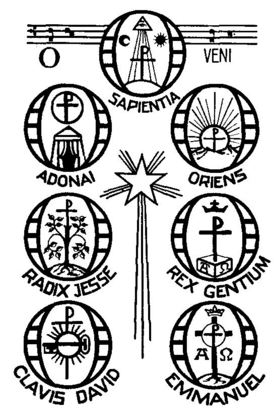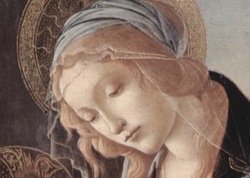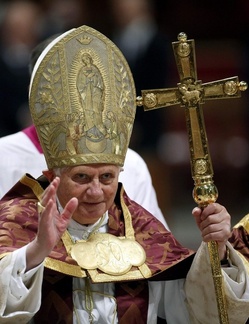Tag: Advent
Christmas Novena, Fourth Oration
O Wine of Virgins and Lily of Purity, Who by a touch
of Your hand heals the body and cleanses the soul; Who by dwelling in the womb
of Your Mother has made her the purest of the pure and most admirable among
virgins; We beseech You, through Your Pure Nativity and through the intercession
of Your Mother and Saint Joseph, Your Chosen One, to grant us to be pure in
soul and body and clean in act clean and thought, that we may serve You with a
clean heart and pure body all the days of our lives. Amen.
Christmas Novena, Third Oration
O Admirable Leader Who gains the obedience of Your
people not by the severity of Your judgment but by the sweetness of Your love
and Your welcome sojourn among us. We beseech You, through Your Pure Nativity
and through the intercession of Your Mother and Saint Joseph, Your Chosen One,
to teach us complete obedience to Your holy commandments and to submit to our
superiors, not for fear of punishment but by a willing surrender of mind and
heart, with gladness of heart and spirit. Amen.
Christmas Novena, Second Oration
O Hope of the Patriarchs and longing of the Gentiles,
in Your Nativity You have granted us hope. The joy of this hope has called
together the Shepherds, the Magi and all believers in Your Holy Name, and led
them to adore You with all the acclaim of their hearts. We beseech You, through
Your Pure Nativity and through the intercession of Your Virgin Mother and Saint
Joseph, Your Chosen One, to keep us, by Your grace, from attachment to earthly
goods. Teach us not to depend only on ourselves and the weak ones of this
world, but to rely only on Your Fatherly direction and Your Divine Providence.
Attract our hearts and minds to reflect on Your heavenly riches and to aspire and
long for them above. Amen.
The Greater Antiphons (aka ‘O Antiphons’) of Advent
Advent slightly shifts its focus beginning tomorrow (December 17) when the antiphons for Vespers known
as the Greater Antiphons, but more commonly known as the O Antiphons, are sung.
These biblical texts are sung as the verse introducing the
Magnificat song at Vespers. Most people know these Great Antiphons as the hymn
called “O Come, O Come Emmanuel” (Veni, Veni, Emmánuël). Each verse of the hymn is a reworded
version of the O Antiphons, with the last being the first verse. Rather unfortunately too many priests and church musicians/choir leaders have little understanding of why one would hold off from signing “O Come, O Come Emmanuel” at Mass until this time of Advent, and even then, why one would spread the verses out over the days ahead. (I wonder if we can get our act together to respect the Liturgy and its history to allow the flourishing of the theology to dig more deeply into our hearts and minds.)
Each O Antiphon
addresses Jesus with a title which comes from the prophecies of Isaiah that
anticipate the coming of the Messiah. The first letters of the titles in the
original Latin in reverse order spell “Ero Cras,” meaning “Tomorrow, I will
come.”
December 17 – O Sapiéntia: O Wisdom Who camest out of the mouth of the
Most High, reaching from end to end and ordering all things mightily and
sweetly: come and teach us the way of prudence.
December 18 – O Adonái: O
Adonai, and Leader of the house of Israel, Who didst appear to Moses in the
flame of the burning bush, and didst give unto him the law on Sinai: come and
with an outstretched arm redeem us.
December 19 – O Radix Jesse: O Root of
Jesse, Who standest for an ensign of the people, before Whom kings shall keep
silence, and unto Whom the Gentiles shall make their supplication: come to
deliver us, and tarry not.
December 20 – O Clavis David: O Key of David, and
Sceptre of the house of Israel, Who openest and no man shutteth, Who shuttest
and no man openeth: come and bring forth from his prison-house, the captive
that sitteth in darkness and in the shadow of death.
December 21 – O Óriens: O
Dawn of the East, Brightness of the light eternal, and Sun of justice: come and
enlighten them that sit in darkness and in the shadow of death.
December 22 – O
Rex Gentium: O King of the Gentiles and the Desired of them, Thou Corner-stone
that makest both one: come and deliver man, whom Thou didst form out of the
dust of the earth.
December 23 – O Emmánuël: O Emmanuel, our King and Lawgiver,
the Expected of the nations and their Savior: come to save us, O Lord our God.
THE most significant Advent antiphon
In my opinion, the best antiphon beside the O Antiphons (which begin tomorrow at Vespers), and I am merely echoing the informed opinions of liturgical scholars, is the Rorate caeli (Rain down you heavens) antiphon in the Advent season. It is the expectation of Israel seen through the eyes of the prophet Isaiah (45:8). The whole purpose of the Incarnation is spoken of here:
Drop down dew, ye heavens, from above, and let the clouds rain the Just One.
Be not angry, O Lord, and remember no longer our iniquity: behold the city of Thy sanctuary is become a desert, Sion is made a desert. Jerusalem is desolate, the house of our holiness and of Thy glory, where our fathers praised Thee.
Drop down dew, ye heavens, from above, and let the clouds rain the Just One.
We have sinned, and we are as one unclean, and we have all fallen as a leaf; and our iniquities, like the wind, have taken us away thou hast hid Thy face from us, and hast crushed us by the hand of our iniquity
Drop down dew, ye heavens, from above, and let the clouds rain the Just One.
See, O Lord, the affliction of Thy people, and send him whom thou hast promised to send. Send forth the Lamb, the ruler of the earth, from the rock of the desert to the mount of the daughter of Sion, that he himself may take off the yoke of our captivity.
Drop down dew, ye heavens, from above, and let the clouds rain the Just One.
Be comforted, be comforted, my people; thy salvation shall speedily come. Why wilt thou waste away in sadness? why hath sorrow seized thee? I will save thee; fear not: for I am the Lord thy God, the Holy One of Israel, thy Redeemer.
Drop down dew, ye heavens, from above, and let the clouds rain the Just One.
Advent: a recognition of the point of the Birth of Christ
It is truly meet and just, right and available to salvation, that we should give thanks to thee, O Lord God, almighty: and that we
should, whilst invoking Thy power, celebrate the feasts of the blessed Virgin Mary; from whose womb grew the Fruit, which has filled with the Bread of angels. That Fruit which Eve took from us when she sinned, Mary has restored to us, and it has saved us. Not as the work of the serpent is the work of Mary. From the one, came the poison of our destruction; from the other, the mysteries of salvation. In the one, we see the malice of the tempter; in the other, the help of the divine Majesty. Be the one, came death to the creature; by the other the resurrection of the Creator, by whom human nature, now not captive but free, is restored; and what it lost by its parent Adam, it regained by its Maker Christ.
Advent 2009: Come Lord, Jesus, “my eyes are toward, You Lord, leave me not defenseless”
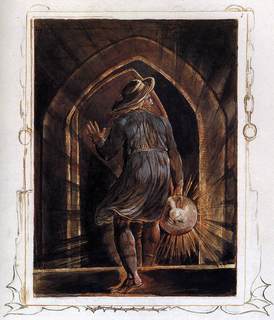 To Thee, O Lord, have I lifted up my soul: in Thee, O my God, I put my trust; let me not be ashamed. Neither let my enemies laugh at me: for none of them that wait on Thee shall be confounded.
To Thee, O Lord, have I lifted up my soul: in Thee, O my God, I put my trust; let me not be ashamed. Neither let my enemies laugh at me: for none of them that wait on Thee shall be confounded.
O Emmanuel
The Great Antiphon for December 23
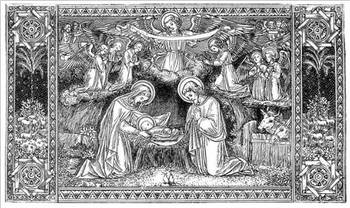 O Emmanuel, God with us, our King and Lawgiver, the expected of the nations and their Savior: Come to save us, O Lord our God.
O Emmanuel, God with us, our King and Lawgiver, the expected of the nations and their Savior: Come to save us, O Lord our God.
O Emmanuel, Rex et legifer noster, exspectatio Gentium, et Salvator earum: veni ad salvandum nos, Domine, Deus noster.
Isaiah 7:14; 88:8; 33:22; Genesis 49:10; cf. Ezekiel 21:32.
Symbols: tablets of stone, Chalice and Host.
O King of the Gentiles
The Great Antiphon for December 22
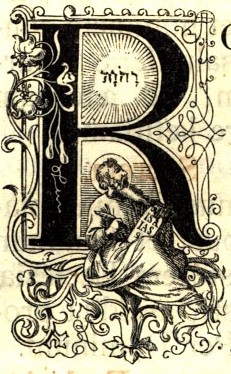 O King of the Gentiles and their desired One, the Cornerstone that makes both one: Come, and deliver man, whom You formed out of the dust of the earth.
O King of the Gentiles and their desired One, the Cornerstone that makes both one: Come, and deliver man, whom You formed out of the dust of the earth.
O Rex Gentium, et desideratus earum, lapisque angularis, qui facis utraque unum: veni, et salva hominem, quem de limo formasti.
Psalm 2:7-8; Haggai 2:8; Genesis 2:7; Ephesians 2:14-20.
Symbols, Crown, scepter.
